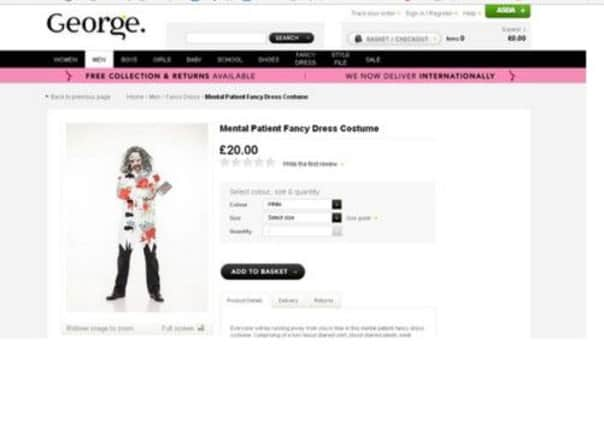Stan Collymore joins in condemnation of Asda ‘mental patient’ costume


The adult bright orange costume called “Psycho Ward” had the word “Committed” printed on the back.
The website description of the costume says: “Dress up as the most thrilling psycho killer character of all time in this Psycho Ward costume, consisting of a bright orange, long-sleeved boiler suit with zip fastener to front, ‘Psycho Ward’ printed on the chest.
Advertisement
Hide AdAdvertisement
Hide Ad“The same words (are) printed on the back in larger letters with a prominent ‘Committed’ stamp just below.”
A Tesco spokeswoman said: “We’re really sorry for any offence this has caused and we are removing this product from sale.”
Leeds-based Asda has also been forced to apologise after it advertised a fancy dress outfit featuring someone covered in blood and brandishing a machete as a “mental patient fancy dress costume”.
The Halloween costume, which is designed to look like a blood-splattered straitjacket with ragged edges, was on sale for £20 through the supermarket’s clothing arm George.
Advertisement
Hide AdAdvertisement
Hide AdMany took to Twitter to express their disgust at the description, including former footballer Stan Collymore, who has fought a well-documented battle with depression.
He tweeted: “Dear ASDA, nice stereotype of ‘Mental patients’. Something you’d expect from the ***. A f***ing joke.”
“Do you actually realise how many people are hanging themselves because of being frightened of the stigma? Wording is CLEAR. MENTAL PATIENT.”
Asda apologised for the incident in a series of tweets and said it would be making a donation to mental health charity Mind.
Advertisement
Hide AdAdvertisement
Hide AdThe company said: “We’re deeply sorry one of our fancy dress costumes has upset people. This was an unacceptable error - the product was withdrawn immediately.
“We’d like to offer our sincere apologies for the offence it’s caused and will be making a sizeable donation to MindCharity.
“We removed the product from our website this afternoon but unfortunately the page may remain visible for a few more hours.”
Former spin doctor Alastair Campbell, who has also suffered from depression, wrote on Twitter: “Look what Asda’s selling... what possesses these people?”
Advertisement
Hide AdAdvertisement
Hide AdKatie Dalton, of Welsh mental health charity Gofal, tweeted: “Dear asda, did you take 1 second to consider how it would affect the 1 in 4 people who experience mental health problems in any given year?
“Dear asda, how on earth did you come to the conclusion that this is an appropriate fancy dress costume? Disgraceful.”
Sue Baker, campaigner for mental health charity Mind, told BBC Radio 4’s Today programme: “Nine out of 10 people using mental health services in patient care report stigma and discrimination from a range of sources.
“Stigma and discrimination is unfortunately still really damaging in England today and this kind of myth of the dangerousness posed by people, that you should be scared of anyone who has used mental health services, is really damaging.
Advertisement
Hide AdAdvertisement
Hide Ad“(Asda) certainly crossed the line here and I hear it might well have been changed with the addition of mental patient, so it was definitely being used to tap into negative stereotypes.”
Marjorie Wallace, chief executive of mental health charity SANE, said: “We welcome Asda’s withdrawal of the costume, which could only serve to reinforce prejudice and misperceptions of mental illness, leaving those already struggling with mental health problems more lonely and excluded.”
Paul Jenkins, chief executive of the charity Rethink Mental Illness, said: “I am pleased to see Asda has now removed the costume from their website, but the fact it was ever there in the first place is completely unacceptable.
“This costume is breathtakingly insensitive, and it’s shocking that Asda ever felt it was an appropriate product to sell. There is already so much stigma surrounding mental illness, and ‘joke’ products like this only serve to make things worse.”